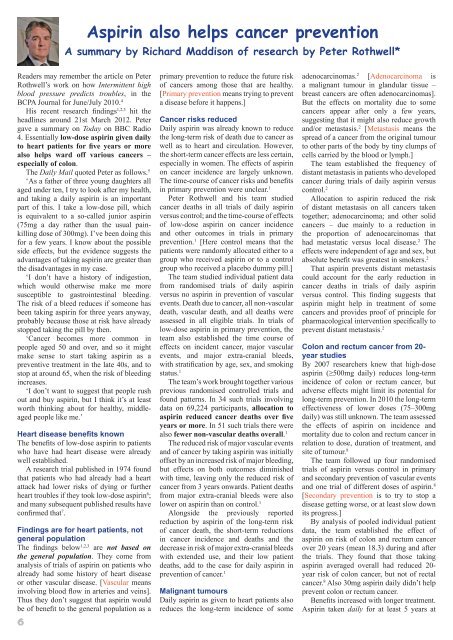BCPA Journal - Issue 184 - British Cardiac Patients Association
BCPA Journal - Issue 184 - British Cardiac Patients Association
BCPA Journal - Issue 184 - British Cardiac Patients Association
Create successful ePaper yourself
Turn your PDF publications into a flip-book with our unique Google optimized e-Paper software.
6<br />
Aspirin also helps cancer prevention<br />
A summary by Richard Maddison of research by Peter Rothwell*<br />
Readers may remember the article on Peter<br />
Rothwell’s work on how Intermittent high<br />
blood pressure predicts troubles, in the<br />
<strong>BCPA</strong> <strong>Journal</strong> for June/July 2010. 4<br />
His recent research findings 1,2,3 hit the<br />
headlines around 21st March 2012. Peter<br />
gave a summary on Today on BBC Radio<br />
4. Essentially low-dose aspirin given daily<br />
to heart patients for five years or more<br />
also helps ward off various cancers –<br />
especially of colon.<br />
The Daily Mail quoted Peter as follows. 5<br />
‘As a father of three young daughters all<br />
aged under ten, I try to look after my health,<br />
and taking a daily aspirin is an important<br />
part of this. I take a low-dose pill, which<br />
is equivalent to a so-called junior aspirin<br />
(75mg a day rather than the usual painkilling<br />
dose of 300mg). I’ve been doing this<br />
for a few years. I know about the possible<br />
side effects, but the evidence suggests the<br />
advantages of taking aspirin are greater than<br />
the disadvantages in my case.<br />
‘I don’t have a history of indigestion,<br />
which would otherwise make me more<br />
susceptible to gastrointestinal bleeding.<br />
The risk of a bleed reduces if someone has<br />
been taking aspirin for three years anyway,<br />
probably because those at risk have already<br />
stopped taking the pill by then.<br />
‘Cancer becomes more common in<br />
people aged 50 and over, and so it might<br />
make sense to start taking aspirin as a<br />
preventive treatment in the late 40s, and to<br />
stop at around 65, when the risk of bleeding<br />
increases.<br />
‘I don’t want to suggest that people rush<br />
out and buy aspirin, but I think it’s at least<br />
worth thinking about for healthy, middleaged<br />
people like me.’<br />
Heart disease benefits known<br />
The benefits of low-dose aspirin to patients<br />
who have had heart disease were already<br />
well established.<br />
A research trial published in 1974 found<br />
that patients who had already had a heart<br />
attack had lower risks of dying or further<br />
heart troubles if they took low-dose aspirin 6 ;<br />
and many subsequent published results have<br />
confirmed that 7 .<br />
Findings are for heart patients, not<br />
general population<br />
The findings below 1,2,3 are not based on<br />
the general population. They come from<br />
analysis of trials of aspirin on patients who<br />
already had some history of heart disease<br />
or other vascular disease. [Vascular means<br />
involving blood flow in arteries and veins].<br />
Thus they don’t suggest that aspirin would<br />
be of benefit to the general population as a<br />
primary prevention to reduce the future risk<br />
of cancers among those that are healthy.<br />
[Primary prevention means trying to prevent<br />
a disease before it happens.]<br />
Cancer risks reduced<br />
Daily aspirin was already known to reduce<br />
the long-term risk of death due to cancer as<br />
well as to heart and circulation. However,<br />
the short-term cancer effects are less certain,<br />
especially in women. The effects of aspirin<br />
on cancer incidence are largely unknown.<br />
The time-course of cancer risks and benefits<br />
in primary prevention were unclear. 1<br />
Peter Rothwell and his team studied<br />
cancer deaths in all trials of daily aspirin<br />
versus control; and the time-course of effects<br />
of low-dose aspirin on cancer incidence<br />
and other outcomes in trials in primary<br />
prevention. 1 [Here control means that the<br />
patients were randomly allocated either to a<br />
group who received aspirin or to a control<br />
group who received a placebo dummy pill.]<br />
The team studied individual patient data<br />
from randomised trials of daily aspirin<br />
versus no aspirin in prevention of vascular<br />
events. Death due to cancer, all non-vascular<br />
death, vascular death, and all deaths were<br />
assessed in all eligible trials. In trials of<br />
low-dose aspirin in primary prevention, the<br />
team also established the time course of<br />
effects on incident cancer, major vascular<br />
events, and major extra-cranial bleeds,<br />
with stratification by age, sex, and smoking<br />
status. 1<br />
The team’s work brought together various<br />
previous randomised controlled trials and<br />
found patterns. In 34 such trials involving<br />
data on 69,224 participants, allocation to<br />
aspirin reduced cancer deaths over five<br />
years or more. In 51 such trials there were<br />
also fewer non-vascular deaths overall. 1<br />
The reduced risk of major vascular events<br />
and of cancer by taking aspirin was initially<br />
offset by an increased risk of major bleeding,<br />
but effects on both outcomes diminished<br />
with time, leaving only the reduced risk of<br />
cancer from 3 years onwards. Patient deaths<br />
from major extra-cranial bleeds were also<br />
lower on aspirin than on control. 1<br />
Alongside the previously reported<br />
reduction by aspirin of the long-term risk<br />
of cancer death, the short-term reductions<br />
in cancer incidence and deaths and the<br />
decrease in risk of major extra-cranial bleeds<br />
with extended use, and their low patient<br />
deaths, add to the case for daily aspirin in<br />
prevention of cancer. 1<br />
Malignant tumours<br />
Daily aspirin as given to heart patients also<br />
reduces the long-term incidence of some<br />
adenocarcinomas. 2 [Adenocarcinoma is<br />
a malignant tumour in glandular tissue –<br />
breast cancers are often adenocarcinomas].<br />
But the effects on mortality due to some<br />
cancers appear after only a few years,<br />
suggesting that it might also reduce growth<br />
and/or metastasis. 2 [Metastasis means the<br />
spread of a cancer from the original tumour<br />
to other parts of the body by tiny clumps of<br />
cells carried by the blood or lymph.]<br />
The team established the frequency of<br />
distant metastasis in patients who developed<br />
cancer during trials of daily aspirin versus<br />
control. 2<br />
Allocation to aspirin reduced the risk<br />
of distant metastasis on all cancers taken<br />
together; adenocarcinoma; and other solid<br />
cancers – due mainly to a reduction in<br />
the proportion of adenocarcinomas that<br />
had metastatic versus local disease. 2 The<br />
effects were independent of age and sex, but<br />
absolute benefit was greatest in smokers. 2<br />
That aspirin prevents distant metastasis<br />
could account for the early reduction in<br />
cancer deaths in trials of daily aspirin<br />
versus control. This finding suggests that<br />
aspirin might help in treatment of some<br />
cancers and provides proof of principle for<br />
pharmacological intervention specifically to<br />
prevent distant metastasis. 2<br />
Colon and rectum cancer from 20year<br />
studies<br />
By 2007 researchers knew that high-dose<br />
aspirin (≥500mg daily) reduces long-term<br />
incidence of colon or rectum cancer, but<br />
adverse effects might limit its potential for<br />
long-term prevention. In 2010 the long-term<br />
effectiveness of lower doses (75–300mg<br />
daily) was still unknown. The team assessed<br />
the effects of aspirin on incidence and<br />
mortality due to colon and rectum cancer in<br />
relation to dose, duration of treatment, and<br />
site of tumour. 8<br />
The team followed up four randomised<br />
trials of aspirin versus control in primary<br />
and secondary prevention of vascular events<br />
and one trial of different doses of aspirin. 8<br />
[Secondary prevention is to try to stop a<br />
disease getting worse, or at least slow down<br />
its progress.]<br />
By analysis of pooled individual patient<br />
data, the team established the effect of<br />
aspirin on risk of colon and rectum cancer<br />
over 20 years (mean 18.3) during and after<br />
the trials. They found that those taking<br />
aspirin averaged overall had reduced 20year<br />
risk of colon cancer, but not of rectal<br />
cancer. 8 Also 30mg aspirin daily didn’t help<br />
prevent colon or rectum cancer.<br />
Benefits increased with longer treatment.<br />
Aspirin taken daily for at least 5 years at



